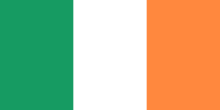

Irish nationalism is a nationalist political movement which, in its broadest sense, asserts that the people of Ireland should govern Ireland as a sovereign state.[1][2][3][4] Since the mid-19th century, Irish nationalism has largely taken the form of cultural nationalism based on the principles of national self-determination and popular sovereignty.[5][6][7][2] Irish nationalists during the 18th, 19th, and 20th centuries such as the United Irishmen in the 1790s, Young Irelanders in the 1840s, the Fenian Brotherhood during the 1880s, Fianna Fáil in the 1920s, and Sinn Féin styled themselves in various ways after French left-wing radicalism and republicanism.[8][9] Irish nationalism celebrates the culture of Ireland, especially the Irish language, literature, music, and sports. It grew more potent during the period in which all of Ireland was part of the United Kingdom, which led to most of the island gaining independence from the UK in 1922.
Irish nationalists believe that foreign English and later British rule in Ireland from the 1169 English Norman Invasion of Ireland onwards has been detrimental to Irish interests.[10] At the time of the partition of Ireland most of the island was Roman Catholic and largely indigenous, while a sizeable portion of the country, particularly in the north, was Protestant and chiefly descended from people of Great Britain who colonised the land as settlers during the reign of King James I in 1609. Partition was along these ethno-religious lines, with most of Ireland gaining independence, while six northern counties remained part of the United Kingdom. Irish nationalists support Irish reunification.
- ^ Regan, John. "Review of Irish Freedom: the History of Nationalism in Ireland". Reviews in History. Archived from the original on 16 August 2021. Retrieved 14 June 2021.
- ^ a b Murray, Peter (1 January 1993). "Irish cultural nationalism in the United Kingdom state: Politics and the Gaelic League 1900–18". Irish Political Studies. 8 (1): 55–72. doi:10.1080/07907189308406508 – via Taylor and Francis+NEJM.
- ^ "Politics – An Outline of the Main Political 'Solutions' to the Conflict". CAIN. United Ireland Definition. Archived from the original on 9 July 2011.
- ^ Tonge, Jonathan (2013). Northern Ireland: Conflict and Change. Routledge. p. 201. ISBN 978-1317875185. Archived from the original on 12 April 2017. Retrieved 12 April 2017.
- ^ Sa'adah 2003, 17–20.
- ^ Smith 1999, 30.
- ^ Delanty, Gerard; Kumar, Krishan. The Sage handbook of nations and nationalism. London; Thousand Oaks, California; New Delhi: Sage Publications, Ltd, 2006, 542.
- ^ Metscher, Thomas (25 November 1989). "Between 1789 and 1798: the "Revolution in the Form of Thought" in Ireland". Études irlandaises. 14 (1): 139–146. doi:10.3406/irlan.1989.2517. Archived from the original on 13 December 2020. Retrieved 25 November 2020 – via persee.fr.
- ^ Murray, Peter (1993). "Irish cultural nationalism in the United Kingdom state: Politics and the Gaelic League 1900–18". Irish Political Studies. 8: 55–72. doi:10.1080/07907189308406508. Archived from the original on 17 August 2021. Retrieved 25 November 2020.
- ^ Coakley, John (2004). Ethnic Conflict and the Two-State Solution: The Irish Experience of Partition (PDF). Mapping Frontiers, Plotting Pathways Ancillary Paper No. 3. pp. 3–5.